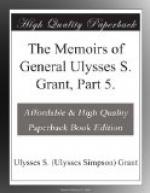To show the difficulty experienced in maintaining the blockade, I will mention a circumstance that took place at Fort Fisher after its fall. Two English blockade runners came in at night. Their commanders, not supposing the fort had fallen, worked their way through all our fleet and got into the river unobserved. They then signalled the fort, announcing their arrival. There was a colored man in the fort who had been there before and who understood these signals. He informed General Terry what reply he should make to have them come in, and Terry did as he advised. The vessels came in, their officers entirely unconscious that they were falling into the hands of the Union forces. Even after they were brought in to the fort they were entertained in conversation for some little time before suspecting that the Union troops were occupying the fort. They were finally informed that their vessels and cargoes were prizes.
I selected General Weitzel, of the Army of the James, to go with the expedition, but gave instructions through General Butler. He commanded the department within whose geographical limits Fort Fisher was situated, as well as Beaufort and other points on that coast held by our troops; he was, therefore, entitled to the right of fitting out the expedition against Fort Fisher.
General Butler conceived the idea that if a steamer loaded heavily with powder could be run up to near the shore under the fort and exploded, it would create great havoc and make the capture an easy matter. Admiral Porter, who was to command the naval squadron, seemed to fall in with the idea, and it was not disapproved of in Washington; the navy was therefore given the task of preparing the steamer for this purpose. I had no confidence in the success of the scheme, and so expressed myself; but as no serious harm could come of the experiment, and the authorities at Washington seemed desirous to have it tried, I permitted it. The steamer was sent to Beaufort, North Carolina, and was there loaded with powder and prepared for the part she was to play in the reduction of Fort Fisher.
General Butler chose to go in command of the expedition himself, and was all ready to sail by the 9th of December (1864). Very heavy storms prevailed, however, at that time along that part of the sea-coast, and prevented him from getting off until the 13th or 14th. His advance arrived off Fort Fisher on the 15th. The naval force had been already assembled, or was assembling, but they were obliged to run into Beaufort for munitions, coal, etc.; then, too, the powder-boat was not yet fully prepared. The fleet was ready to proceed on the 18th; but Butler, who had remained outside from the 15th up to that time, now found himself out of coal, fresh water, etc., and had to put into Beaufort to replenish. Another storm overtook him, and several days more were lost before the army and navy were both ready at the same time to co-operate.




